N-Acetyl L-Tyrosine and BDD: Supporting Mental Clarity
Introduction
When living with Body Dysmorphic Disorder (BDD), the mind often feels like it’s under siege—constantly flooded with self-critical thoughts, emotional overreactions, and fatigue from endless rumination. These obsessive thought loops can drain both focus and motivation, leaving a person mentally foggy and emotionally depleted.
While therapy and mindfulness help retrain thought patterns, there’s another angle worth exploring: neurochemical support. Our ability to think clearly, focus, and regulate emotions depends heavily on neurotransmitters—especially dopamine, norepinephrine, and epinephrine—which power attention, motivation, and mood stability.
This is where N-Acetyl L-Tyrosine (NALT), a highly bioavailable form of the amino acid tyrosine, comes into play. NALT supports the synthesis of key neurotransmitters involved in stress response and mental clarity. For people with BDD, who often experience mental exhaustion and decision fatigue, it may help sharpen focus, balance stress hormones, and restore a sense of cognitive steadiness.
In this article, we’ll explore the science behind N-Acetyl L-Tyrosine, its effects on neurotransmitter function, and how it might support mental clarity, resilience, and self-regulation in the context of BDD.
Looking for supplements for This? Click here.
Understanding BDD and Cognitive Overload ⚡
People with Body Dysmorphic Disorder often describe their mental experience as “crowded.” Thoughts about appearance intrude constantly, leaving little bandwidth for work, relationships, or joy.
This cognitive overload happens because the brain’s attention and reward systems are dysregulated. Studies suggest abnormalities in dopamine and serotonin signaling in BDD, which can lead to:
Difficulty shifting focus away from perceived flaws
Obsessive pattern of thought loops
Low motivation and mental fatigue
Increased stress reactivity
Over time, chronic anxiety and rumination drain neurotransmitters like dopamine and norepinephrine—depleting the brain’s ability to maintain alertness, optimism, and balance.
N-Acetyl L-Tyrosine supports the replenishment of these neurotransmitters, acting as a nutritional foundation for better mental clarity.
What Is N-Acetyl L-Tyrosine (NALT)? 🌿
N-Acetyl L-Tyrosine is a modified, more soluble version of L-tyrosine, an amino acid that serves as a precursor to dopamine, norepinephrine, and epinephrine—the catecholamine neurotransmitters responsible for mental performance, focus, and mood regulation.
Your body naturally produces tyrosine from phenylalanine, but under chronic stress, conversion efficiency drops. Supplementing with NALT provides a more direct and bioavailable form, bypassing this limitation.
In short, NALT helps refill the brain’s reserves of neurotransmitter fuel—critical for staying clear-headed under emotional strain.
How Tyrosine Supports Mental Clarity 🧬
To understand why NALT matters, we need to look at the dopaminergic pathway:
NALT → L-Tyrosine → L-DOPA → Dopamine → Norepinephrine → Epinephrine
Each step requires cofactors like vitamin B6, folate, copper, and vitamin C. When any of these nutrients are low—or when chronic stress depletes them—the pathway slows, leading to low motivation, brain fog, and stress intolerance.
For people with BDD, this biochemical slowdown manifests as:
Racing but unproductive thoughts
Difficulty focusing on non-appearance-related tasks
Feeling “flat,” unmotivated, or detached
Emotional burnout from mental overactivity
By supporting the dopamine and norepinephrine systems, NALT helps restore mental energy and improve cognitive control—making it easier to redirect focus away from obsessive thought loops.
The Brain Under Chronic Stress: A Biochemical Imbalance 🧠

BDD involves more than emotional distress—it’s also a neurochemical imbalance triggered by constant stress and self-scrutiny.
Chronic anxiety elevates cortisol, the body’s main stress hormone. High cortisol suppresses dopamine and serotonin production while increasing oxidative stress in the brain. This leads to:
Impaired working memory
Difficulty concentrating
Emotional numbness or irritability
Reduced problem-solving capacity
N-Acetyl L-Tyrosine helps counteract these effects by restoring catecholamine production, ensuring the brain has the raw materials it needs to function optimally—even under pressure.
NALT and Dopamine: Reclaiming Motivation and Reward 🌟
Dopamine governs how we perceive reward and meaning. In BDD, distorted self-image can interfere with the dopamine feedback loop—making daily life feel less rewarding.
Low dopamine levels can lead to:
Lack of motivation or “drive”
Difficulty experiencing pleasure (anhedonia)
Low focus and energy
Heightened susceptibility to compulsive or repetitive thoughts
By providing the precursor to dopamine, NALT supports healthy dopamine synthesis, potentially improving both motivation and emotional resilience. This helps individuals re-engage with life outside their body-image concerns.
NALT and Norepinephrine: Supporting Focus and Cognitive Balance 🧘
Norepinephrine is the neurotransmitter of alert calmness—it keeps the mind focused without tipping into panic.
People with BDD often swing between hyperarousal (panic, overthinking, emotional spikes) and exhaustion. Norepinephrine plays a key role in balancing these states.
By enhancing norepinephrine synthesis, NALT may:
Improve focus and sustained attention
Strengthen the ability to think under stress
Reduce mental fatigue
Support emotional stability
This makes it easier to engage in therapy, mindfulness, and daily activities without feeling mentally overloaded.
Cognitive Benefits of N-Acetyl L-Tyrosine 🌿
Research on NALT and L-tyrosine shows consistent benefits for mental performance under stress, such as sleep deprivation, multitasking, or emotional strain.
Key findings include:
Improved cognitive flexibility: Better ability to switch tasks and thoughts.
Enhanced working memory: Sharper short-term recall and decision-making.
Stress resilience: Sustained focus even when cortisol levels rise.
Mood stabilization: Reduced irritability and frustration.
For people with BDD—where obsessive loops and low mental energy coexist—this translates into a calmer, clearer mental landscape.
NALT vs L-Tyrosine: Which Is Better? ⚖️
Both NALT and L-tyrosine convert to dopamine, but their bioavailability differs slightly.
L-Tyrosine is the raw amino acid, effective but less soluble.
N-Acetyl L-Tyrosine is more stable in liquid and potentially absorbed more efficiently.
In practice, some individuals respond better to one than the other. NALT is often preferred for daily supplementation because it dissolves easily in water and is gentler on digestion.
Typical comparison:
L-Tyrosine: Higher direct conversion but less stable.
NALT: More consistent absorption, especially under stress.
Combining NALT with Other Supportive Nutrients 🌿💊
NALT works best in synergy with other nutrients that support neurotransmitter synthesis and stress resilience:
Vitamin B6: Converts L-DOPA to dopamine.
Vitamin C: Cofactor for dopamine to norepinephrine conversion.
Magnesium: Balances excitatory signals and supports calm focus.
Rhodiola rosea: Works synergistically to enhance dopamine balance and reduce fatigue.
L-Theanine: Smooths out overstimulation, creating mental clarity without jitters.
Together, these compounds help the brain transition from hyperaroused anxiety to focused calmness—an ideal mental state for emotional recovery.
Looking for supplements for This? Click here.
Emotional Regulation and the Catecholamine Pathway 🌿🧘
In BDD, emotional regulation is often impaired because of dopamine-serotonin imbalance. Dopamine gives us energy and focus; serotonin gives us peace and satisfaction.
When dopamine is low, motivation disappears. When serotonin is low, obsessive thoughts intensify. NALT supports dopamine, indirectly improving balance between the two systems.
When properly balanced, this biochemical harmony leads to:
Improved impulse control
Reduced emotional reactivity
More positive engagement in therapy
Better ability to redirect attention
The Mind-Body Connection: Mental Clarity as a Foundation for Healing 🌿
Clarity isn’t just about thinking faster—it’s about reducing mental noise. For someone with BDD, mental noise can sound like a constant inner critic.
NALT supports clarity by providing the brain with the energy it needs to process emotions efficiently. When dopamine and norepinephrine levels normalize, the prefrontal cortex (responsible for reasoning and perspective) becomes more active—helping override the amygdala’s anxious alarms.
This means fewer “thought storms” and a stronger ability to ground oneself in reality rather than distorted self-perception.
This is why cognitive therapies like CBT often work better when neurotransmitter balance is supported nutritionally.
Ideal Dosage and Timing for N-Acetyl L-Tyrosine 🕐
Typical dosage:
300–600 mg daily, taken on an empty stomach.
Some people benefit from up to 1,000 mg during high-stress periods.
Timing:
Take in the morning or early afternoon to support daytime energy and focus.
Avoid close to bedtime, as it may increase alertness.
Stack suggestions:
Morning: NALT + Rhodiola + B-complex for motivation and focus.
Afternoon: NALT + magnesium or L-theanine to sustain calm productivity.
Consistency is key—neurotransmitter replenishment works gradually, improving focus and emotional regulation over weeks, not days.
Who Might Benefit Most from NALT 🌱
NALT may be especially supportive for people with:
Mental fatigue or low motivation due to chronic anxiety or stress
Difficulty concentrating during therapy or mindfulness exercises
Low mood or flattened emotional response
Tendency to overthink or ruminate
Emotional burnout from constant inner tension
In the context of BDD, NALT helps restore a sense of cognitive vitality, empowering individuals to re-engage with recovery efforts.
Safety, Side Effects, and Precautions ⚠️
NALT is generally well-tolerated, but like any supplement, it’s not a one-size-fits-all solution.
Possible side effects:
Mild headache or nausea (often from excess dosage)
Overstimulation if combined with high caffeine intake
Restlessness if taken too close to bedtime
Precautions:
Avoid if taking MAOIs or stimulant medications unless approved by a doctor.
Not recommended for individuals with hyperthyroidism or severe hypertension without supervision.
When used responsibly, NALT can be a safe addition to a holistic mental wellness plan.
Integrating NALT with Therapy, Mindfulness, and Routine 🧘
No supplement replaces emotional work—but when your brain chemistry supports focus and motivation, inner healing becomes easier.
Combine NALT with:
Cognitive Behavioral Therapy (CBT): Improves cognitive flexibility and engagement.
Looking for online therapy ? Click Here.
Mindfulness practices: Enhances presence and mental stability.
Want to try Breathwork? Click Here.
Physical exercise: Boosts dopamine naturally and reinforces the supplement’s effects.
Journaling: Encourages emotional processing and positive reinforcement.
Together, these create a balanced ecosystem for recovery—nutritional, psychological, and somatic.
The Bigger Picture: Supporting Brain Health Beyond BDD 🧩
Mental clarity isn’t just about thinking better—it’s about creating space for emotional healing. When neurotransmitters are balanced, the nervous system can rest, therapy becomes more effective, and self-perception becomes less distorted.
N-Acetyl L-Tyrosine offers a biochemical foundation for this clarity. It helps rebuild the brain’s resilience to stress and restores the mental sharpness needed to engage fully with life.
By combining it with gentle adaptogens, calming amino acids, and restorative habits, people with BDD can begin to break the cycle of overthinking and exhaustion—moving toward a state of greater focus, emotional stability, and self-compassion.
Final Thoughts: Nourishing Clarity from the Inside Out 🌿🧠
For those battling obsessive self-criticism and cognitive fatigue, clarity isn’t a luxury—it’s liberation.
N-Acetyl L-Tyrosine offers a gentle, natural way to nourish that clarity from within. By replenishing the neurotransmitters that power focus and calm, it supports both the biochemical and emotional foundations of healing.
When the mind feels sharper and steadier, therapy goes deeper, meditation feels easier, and self-compassion starts to replace self-judgment.
In the end, recovery from BDD isn’t just about changing how you see yourself—it’s about changing how your brain allows you to think about yourself. And that begins with clarity. 🌿✨
References 📚
Lieberman, H. R. (2003). Tyrosine and stress: Human and animal studies. Pharmacology Biochemistry and Behavior.
Deijen, J. B., et al. (1999). Tyrosine supplementation improves cognitive performance and reduces blood pressure in stress-prone individuals. Brain Research Bulletin.
Jongkees, B. J., et al. (2015). The effects of tyrosine supplementation on cognitive control under stress. Psychopharmacology.
Rendeiro, C., et al. (2020). N-Acetyl-L-Tyrosine supplementation and cognitive resilience in stressful conditions. Nutrients.
Shurtleff, D., et al. (1994). Tyrosine reverses a cold-induced working memory deficit in humans. Brain Research Bulletin.
Lonnqvist, J., et al. (2009). Dopamine function and emotional regulation in body dysmorphic disorder. Journal of Affective Disorders.
Panossian, A., & Wikman, G. (2010). Effects of adaptogens on stress protection and mental performance. Pharmaceuticals.
Benton, D. (2010). Micronutrient status and mood regulation. Nutrition Reviews.
Gill, M., & Whelan, J. (2019). Amino acids and neurotransmitter balance in mental health. Current Psychiatry Reports.
Young, S. N. (2007). How to increase dopamine and serotonin naturally. Journal of Psychiatry & Neuroscience.
Related Posts
-

Ashwagandha and Co-Dependency: Supporting Stress Resilience
Stress is more than a feeling—it’s a full-body signal that your system is overwhelmed. When the mind races and the body tenses, your hormones, breathing, and focus all shift into survival mode. Chronic stress doesn’t just affect emotions—it reshapes your nervous system, drains your energy, and clouds your clarity. Learning to understand and manage stress gently is the first step toward peace, balance, and true recovery. 🌿💫
-

Why Co-Dependency Feels Draining: Adrenal Fatigue and Supplements That Help
The adrenal glands are small but powerful organs that sit above your kidneys, acting as your body’s built-in stress managers. They produce hormones like cortisol and adrenaline that help regulate energy, mood, and resilience. When they’re overworked from chronic stress or emotional exhaustion, fatigue and imbalance follow. Supporting adrenal health naturally can help restore calm, energy, and hormonal balance. 🌿⚡
-

The Link Between Anxiety, Co-Dependency, and Natural Support
Anxiety feels like living in constant alert mode—your heart races, your thoughts loop, and your body can’t find peace. It’s the nervous system’s way of preparing for danger, even when none exists. Understanding what’s happening in your mind and body is the first step toward calming the storm and restoring balance. 🌿💫
-

Supplements That Support Dopamine and Serotonin in Co-Dependent Patterns
Serotonin is the neurotransmitter of calm, confidence, and contentment. When it’s balanced, you feel peaceful and emotionally grounded. When it’s low, anxiety, mood swings, and emotional dependence take over. By understanding serotonin’s role in emotional health—and how to support it naturally—you can rebuild inner stability, improve relationships, and cultivate lasting happiness from within. 🌞💫
-

How Emotional Exhaustion in Codependency Impacts the Nervous System
The nervous system is the body’s communication network, connecting the brain to every organ and muscle. It regulates stress, mood, and emotion through a delicate balance of electrical and chemical signals. When overwhelmed, it can become dysregulated—leading to fatigue, anxiety, and emotional imbalance. Understanding how to calm and strengthen the nervous system is key to healing from chronic stress and emotional burnout. ⚡🌿
-

What Is Co-Dependency? The Role of Brain Chemistry and Stress
Stress is more than a feeling—it’s a full-body experience that begins in the brain and ripples through every cell. When cortisol surges and the nervous system stays on alert, your body can’t rest or recover. Over time, this constant tension affects energy, focus, mood, and even immune health. Understanding stress chemistry is the first step toward breaking free from burnout and finding calm again. 🌿
-

Creating a Supplement Stack for Motivation, Energy, and Anti-Procrastination
Motivation is the fuel behind every meaningful achievement—but it’s not just about willpower. It’s a mix of mindset, brain chemistry, and momentum. When energy, focus, and purpose align, action feels natural instead of forced. Learn how to harness motivation as a daily state, not a fleeting feeling.
-

Supplements for Building Consistency and Reducing Chronic Procrastination
Biochemistry is the bridge between biology and chemistry—the science of life at the molecular level. It explains how nutrients, hormones, and neurotransmitters interact to create energy, thought, and emotion. From brain function to muscle movement, biochemistry reveals the invisible processes that sustain health, balance, and vitality.
-

GABA and Procrastination: Supporting Calm Focus for Productivity
GABA is the brain’s natural calming messenger—a neurotransmitter that helps slow mental overactivity and ease stress. When GABA levels drop, focus fades, anxiety rises, and procrastination becomes more likely. By supporting GABA through nutrition, lifestyle, and supplements, you can restore calm clarity, improve focus, and take action with steady, balanced energy.
-

Ashwagandha and Procrastination: Lowering Stress to Improve Action
Science is the language of curiosity and discovery. It helps us understand the hidden patterns behind life, energy, and the universe. Through experimentation and critical thinking, science connects imagination to evidence—turning questions into knowledge. Whether through microscopes, molecules, or minds at work, science represents our endless pursuit of truth and innovation.
-

Neurotransmitters and Motivation: Supplements That Support Drive and Focus
Supplements can do more than boost physical health—they can also enhance mental clarity, focus, and motivation. Nutrients like omega-3s, magnesium, B vitamins, and adaptogens help balance neurotransmitters, stabilize mood, and support brain energy. When combined with good sleep, nutrition, and mindful habits, they can transform how your brain performs under stress.
-

How Stress Hormones Like Cortisol Fuel Procrastination (and What Helps)
Blood sugar isn’t just about physical health—it directly impacts focus, mood, and motivation. When glucose levels spike and crash, energy and attention do the same, fueling procrastination and brain fog. Learning how to stabilize blood sugar through balanced meals, mindful habits, and key nutrients helps keep your mind steady, focused, and ready to act.
-

Brain Fog and Procrastination: Supplements for Mental Clarity
Brain fog can turn even simple tasks into mental hurdles. When your thoughts feel slow and unclear, procrastination often follows—making focus and productivity seem impossible. This article explores the biochemical and lifestyle causes of brain fog and reveals the most effective supplements for restoring mental clarity, focus, and sustained energy.
-

The Link Between Low Energy and Procrastination: Can Supplements Help?
Neurochemistry shapes how we think, feel, and act. When neurotransmitters like dopamine, serotonin, and GABA fall out of balance, it can lead to fatigue, anxiety, or lack of motivation—fueling procrastination and low mood. Understanding the brain’s chemical communication system helps us find ways to restore focus, calm, and emotional stability through nutrition, mindfulness, and targeted supplements.
-

Why Do We Procrastinate? The Role of Dopamine and Supplements That Support It
Dopamine is the brain’s motivation messenger—the chemical that fuels focus, reward, and drive. When dopamine levels drop, even simple tasks can feel impossible to start. This article explores how dopamine shapes procrastination, motivation, and mental energy, along with natural supplements and daily habits that help restore balance and get things done.
-

Phosphatidylserine and Stress Reduction for People with BDD
Stress is more than a mental state—it’s a full-body experience that affects hormones, brain chemistry, and emotional balance. For people with Body Dysmorphic Disorder (BDD), constant tension and worry about appearance can overload the nervous system. Learning how stress works and finding ways to calm it is key to breaking the cycle of anxiety and self-criticism.
-

How Antioxidants Like Vitamin C & E Support Mental Health in BDD
Antioxidants are the body’s natural defense against stress and inflammation. For people with Body Dysmorphic Disorder (BDD), oxidative stress can worsen fatigue, anxiety, and emotional imbalance. Nutrients like Vitamin C and E help protect brain cells, boost neurotransmitter function, and support a calmer, clearer mindset—building a stronger foundation for recovery.
-

Ginkgo Biloba and Memory Support for BDD Recovery
Emotional regulation is the foundation of healing from Body Dysmorphic Disorder (BDD). When the nervous system stays in constant overdrive, even small stressors can trigger self-critical spirals. Learning to calm emotional reactivity helps restore clarity, confidence, and a sense of inner balance. By blending mindfulness, nervous system support, and self-compassion, you can retrain your brain to respond—not react—to emotion.
-

Alpha GPC and Cognitive Function in Body Dysmorphic Disorder
Mental fatigue can feel like your brain has hit a wall—thoughts slow down, focus fades, and motivation disappears. For people with Body Dysmorphic Disorder (BDD), chronic overthinking, emotional stress, and constant self-evaluation can deplete mental energy even further. Understanding what causes this cognitive exhaustion is the first step toward recovery—through rest, balanced nutrition, and targeted brain-supporting supplements.
-

Chamomile and Lavender for Calming Obsessive Body Image Thoughts
The nervous system is the command center of our emotional and physical world—and in Body Dysmorphic Disorder (BDD), it often operates in overdrive. Understanding how the brain and body communicate under stress reveals why intrusive thoughts feel uncontrollable. Learning to regulate the nervous system through calm practices, nutrition, and supplements helps restore inner balance and emotional safety.
-

Adaptogens for Body Dysmorphic Disorder: Rhodiola, Ginseng, and More
Rhodiola rosea, often called the “golden root,” is an adaptogenic herb renowned for boosting stress resilience and mental endurance. For individuals with Body Dysmorphic Disorder (BDD), Rhodiola may help reduce fatigue, regulate cortisol, and enhance emotional balance. By supporting both mind and body, this powerful plant promotes calm focus, improved mood, and renewed energy to face daily challenges.
-

B Vitamins for Stress Resilience in BDD: Rebuilding Calm from Within
Biochemistry is at the heart of every thought, emotion, and reaction we experience. In Body Dysmorphic Disorder (BDD), chemical imbalances in neurotransmitters like serotonin, dopamine, and GABA can amplify stress and distort self-perception. Understanding the biochemistry behind mood and stress regulation offers a path toward healing—bridging the gap between emotional experience and the body’s molecular balance.
-

Melatonin and Body Dysmorphic Disorder: Restoring Healthy Sleep Patterns
Melatonin, the body’s natural sleep hormone, plays a vital role in helping people with Body Dysmorphic Disorder (BDD) restore healthy sleep cycles. When anxiety and obsessive thinking interfere with rest, melatonin levels often drop, leading to more emotional reactivity and distorted self-perception. This article explores how melatonin works, why BDD disrupts it, and how natural supplementation—combined with mindful routines—can help the brain and body finally find calm at night.
-

Sleep Struggles with BDD: Supplements for Rest and Recovery
When you’re living with Body Dysmorphic Disorder (BDD), restful sleep can feel impossible—but the right supplements can help reset your body’s natural rhythm. From magnesium and L-theanine to 5-HTP and ashwagandha, these nutrients support relaxation, lower cortisol, and enhance melatonin production. This article explores how supplements can calm the mind, ease nighttime anxiety, and promote true restorative sleep for emotional and physical recovery.
-

5-HTP and Serotonin Balance: Could It Help with Body Dysmorphic Disorder?
Anxiety can feel like a storm inside the mind—restless, overwhelming, and hard to control. In people with Body Dysmorphic Disorder (BDD), anxiety often fuels obsessive thoughts and self-criticism, creating a painful cycle of worry and self-doubt. This article explores the biological roots of anxiety, the role of neurotransmitters like serotonin and GABA, and how natural strategies such as mindfulness, supplements, and nervous system regulation can restore calm and mental clarity.
-

Can Ashwagandha Help Ease Stress and Anxiety in Body Dysmorphic Disorder?
Neurotransmitters like serotonin, dopamine, GABA, and acetylcholine are the chemical messengers that shape how we think, feel, and react to stress. In Body Dysmorphic Disorder (BDD), imbalances in these neurotransmitters can amplify anxiety, obsessive thinking, and emotional distress. This article explores how restoring healthy brain chemistry through nutrition, supplements, and mindfulness can help bring clarity, calm, and emotional stability.
-

L-Theanine for BDD: Finding Calm in the Mind
Neurochemistry plays a central role in how we think, feel, and see ourselves. For those living with Body Dysmorphic Disorder (BDD), imbalances in neurotransmitters like serotonin, dopamine, and GABA can intensify anxiety, obsessive thoughts, and emotional distress. This article explores how regulating brain chemistry through supplements, mindfulness, and lifestyle changes can bring the nervous system back into harmony and restore inner calm.
-

Omega-3 Fatty Acids and Body Image Disorders: Supporting Emotional Health
Omega-3 fatty acids do far more than support heart health—they nourish the brain, stabilize mood, and may ease the emotional turbulence tied to body image disorders like BDD. This in-depth article explores how omega-3s regulate serotonin, dopamine, and inflammation, helping individuals reduce obsessive thoughts and rebuild self-acceptance. It also connects nutrition to therapy, mindfulness, and nervous system balance for holistic emotional healing.
-

Magnesium and BDD: Calming an Overactive Nervous System
Magnesium plays a crucial role in calming an overactive nervous system—something people with Body Dysmorphic Disorder (BDD) struggle with daily. This article explores how magnesium supports relaxation, emotional regulation, and stress reduction while diving into the science behind its connection to brain chemistry. It also examines how combining magnesium supplementation with therapy and breathwork can help rebalance the body’s stress response, reduce obsessive thought patterns, and promote lasting nervous system calm.
-

The Gut-Brain Axis and BDD: Why Probiotics Might Matter
The gut and brain are constantly in conversation — and that dialogue may shape how you experience Body Dysmorphic Disorder. By nurturing your microbiome with probiotics, prebiotics, and gut-healing nutrients, you can help rebalance serotonin, calm anxiety, and restore emotional stability from within 🧠🦠.
-
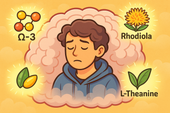
Brain Fog and Body Dysmorphic Disorder: Can Nootropic Supplements Help?
Brain fog often accompanies Body Dysmorphic Disorder, clouding focus and deepening emotional fatigue. Nootropic supplements like L-theanine, Rhodiola, and CoQ10 can help restore mental clarity, balance neurotransmitters, and bring calm energy back to the mind 🌿🧠.
-

How Stress Hormones Like Cortisol May Worsen Body Dysmorphic Disorder
Chronic stress floods the brain with cortisol — the hormone that keeps you on high alert. In Body Dysmorphic Disorder, this chemical overdrive fuels anxiety, distorts self-image, and traps the body in survival mode. Calming cortisol helps restore both peace and perspective 🌿🧠.
-

The Role of Neurotransmitters in BDD—and How Supplements May Help
Neurotransmitters like serotonin, dopamine, glutamate, and GABA shape how people with Body Dysmorphic Disorder perceive themselves. When these brain messengers fall out of balance, perception distorts — but targeted supplements can help restore calm, focus, and emotional regulation 🧠🌿.
-

What Is Body Dysmorphic Disorder? A Deeper Look at the Mind-Body Connection
Body Dysmorphic Disorder (BDD) isn’t just about appearance — it’s about perception. When brain chemistry, trauma, and stress distort self-image, the mind begins to see flaws that aren’t truly there. Healing starts by calming the nervous system and reconnecting mind and body 🪞🧠.
-

Keeping Calm in Competitive Sports: How to Train Your Mind, Body, and Chemistry for Peak Performance
Competitive pressure can overwhelm even the strongest athletes — but calm is trainable. By combining supplements like magnesium, L-theanine, and adaptogens with breathwork and mindset training, you can stay focused, balanced, and in control under any level of stress 🧠🏅.
-

Supplements for Parents Facing Toddler Tantrums: Staying Calm When Little Emotions Run Wild
Toddler tantrums can drain even the most loving parent — but your calm is powerful. With the right supplements like magnesium, L-theanine, and ashwagandha supporting your nervous system, you can stay patient, grounded, and kind, even when emotions run high 🧸🌿.
-

Workplace Stress and Anger Management Support
Workplace stress can quickly turn into frustration — but calm is a skill you can train. By combining supplements like magnesium, L-theanine, and adaptogens with breathwork and mindset tools, you can stay focused, patient, and emotionally grounded no matter how intense the office gets 💼🌿.
-

How to Stay Patient With Family During Stressful Holidays
Holiday gatherings can stir up old stress and test your patience — but calm is possible. With nervous system support from magnesium, L-theanine, and adaptogens, plus mindful breathing and clear boundaries, you can stay centered, kind, and grounded even when family chaos unfolds 🎄💞.
-

Supplements to Keep Calm During Traffic Jams
Getting stuck in traffic doesn’t have to ruin your mood. With calming supplements like magnesium, L-theanine, and ashwagandha, you can train your body to stay relaxed and focused behind the wheel — turning gridlock into a moment of grounded patience 🚗🌿.
-
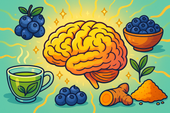
The Role of Antioxidants in Healing Brain Stress from Dissociation
Antioxidants protect the brain from the oxidative stress caused by trauma and dissociation. By neutralizing free radicals and supporting mitochondrial recovery, they help restore clarity, focus, and emotional balance — allowing the mind to heal at the cellular level 🌿🧠.
-
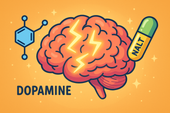
N-Acetyl L-Tyrosine (NALT) for Supporting Mental Clarity
N-Acetyl L-Tyrosine (NALT) fuels dopamine production — the neurotransmitter of focus and motivation. By supporting brain chemistry during stress, NALT helps restore mental clarity, energy, and alertness, making it easier to think clearly and feel present again ⚡🧠.
-

How Ginseng May Improve Focus and Energy in Dissociation
Ginseng helps combat the mental fatigue and fog that often come with dissociation. By supporting mitochondrial energy, balancing neurotransmitters, and regulating cortisol, it gently restores focus, motivation, and emotional presence — helping the mind reconnect with clarity and strength 🌿⚡.
-
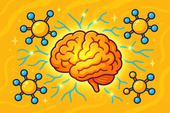
Phosphatidylserine and Dissociation: Supporting Cognitive Function
Phosphatidylserine helps calm the stress response by balancing cortisol, the body’s primary stress hormone. By lowering cortisol spikes, it protects memory, focus, and emotional stability — restoring clarity and mental presence for those struggling with dissociation 🧠🌿.
-
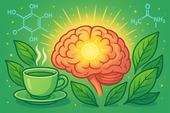
Can Green Tea Extract Help with Dissociative Brain Fog?
Green tea extract may help lift dissociative brain fog by supporting neurotransmitter balance, reducing inflammation, and enhancing energy at the cellular level. With its key compounds EGCG and L-theanine, it promotes calm focus, clarity, and emotional presence — helping you feel more alert and grounded 🍵🧠.
-
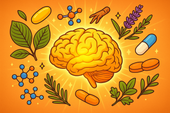
Building a Natural Supplement Stack for Dissociation Support
Building a supplement stack for dissociation means nourishing the brain and body back into communication. By supporting neurotransmitters, gut health, and energy balance through nutrients like magnesium, omega-3s, curcumin, and probiotics, you can help restore clarity, calm, and connection — one layer at a time 🌿🧠.
-

Chamomile and Lavender for Dissociative Anxiety Relief
Chamomile and lavender work together to calm dissociative anxiety by soothing the nervous system and restoring emotional safety. Their natural compounds balance cortisol, enhance GABA activity, and activate the vagus nerve — helping you feel grounded, connected, and at peace again 🌿💜.
-
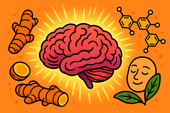
Curcumin for Inflammation and Mental Clarity in Dissociation
Curcumin, the golden compound in turmeric, does more than fight inflammation — it helps clear the mental fog often tied to dissociation. By calming neuroinflammation, balancing neurotransmitters, and supporting mitochondrial energy, curcumin can restore mental clarity, focus, and emotional presence 🌿🧠.
-
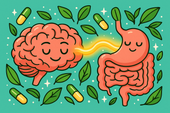
Probiotics and Dissociation: Exploring the Gut–Brain Axis
The gut–brain axis plays a vital role in emotional awareness and presence. When the microbiome is balanced, it supports serotonin production, vagus nerve activity, and calm focus. Probiotics help repair this connection — restoring safety, clarity, and the feeling of truly being in your body again 🌿🧠.
-
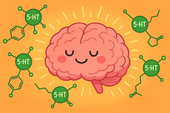
5-HTP for Dissociation: Supporting Serotonin and Emotional Stability
5-HTP helps bridge the gap between emotional numbness and stability by supporting serotonin production — the neurotransmitter that shapes mood, sleep, and sensory awareness. For people experiencing dissociation, 5-HTP may gently restore connection, presence, and emotional balance from the inside out 🌿🧠.

















































